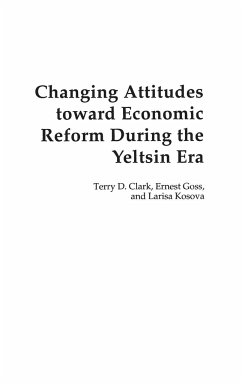On December 31, 1999, Boris Yeltsin stepped down as president of the Russian Federation, marking the end of an era. While scholars and observers alike continue to debate the degree to which Russia succeeded in establishing democracy or a free market economy, the enormity of the social transformation that occurred during the Yeltsin era is far less disputable. For the social stratification that emerged changed the very face of Russian society. Much criticism has been leveled at the political corruption that marred the Yeltsin era. However, the economic and political reforms enacted under Yeltsin also permitted the opening of new channels of social mobility, particularly in the larger cities. Those who benefited most from the reforms became its strongest supporters, allowing the creation of a nascent middle class. The book's focus on this socioeconomic group is unique, as most analyses of the Yeltsin era largely ignore it.
Hinweis: Dieser Artikel kann nur an eine deutsche Lieferadresse ausgeliefert werden.
Hinweis: Dieser Artikel kann nur an eine deutsche Lieferadresse ausgeliefert werden.








